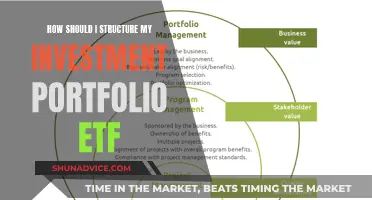
Private equity is a form of investment that takes place outside of the public stock market. Investors gain an ownership stake in private companies, which are not traded on a stock exchange. Private equity funds are typically offered by private equity firms, which manage and invest that money.
Private equity is often grouped with venture capital and hedge funds as an alternative investment. Investors in this asset class are usually required to commit significant capital for years, which is why access to such investments is limited to institutions and individuals with high net worth.
There are several ways to invest in private equity, including through mutual funds, exchange-traded funds, SPACs, and crowdfunding. However, keep in mind that many private equity opportunities are only offered to qualified investors and may require a sizable minimum commitment as well as a high net worth.
| Characteristics | Values |
|---|---|
| Minimum Investment Requirement | Typically $25 million, but can be as low as $250,000 or even $25,000 |
| Investment Period | 10-12 years |
| Investor Type | Institutional investors and wealthy individuals, such as large university endowments, pension plans, and family offices |
| Investment Types | Funds of funds, ETFs, SPACs, crowdfunding |
| Returns | Historically higher than public markets |
| Risk | Very high |
What You'll Learn

Understanding the high risks and potential losses
Private equity investments carry a high level of risk and potential for losses that all investors should be aware of. Here are some key points to understand about the risks and potential losses associated with private equity investments:
High Investment Minimums and Liquidity Risk
Private equity investments often have high minimum investment requirements, typically ranging from $250,000 to $25 million. Such large sums of money can magnify both gains and losses. Private equity investors are expected to keep their funds invested for several years, usually between four and ten years, which creates liquidity risk. This long investment horizon means that investors may not be able to access their funds easily and may be committed to the investment for a significant period.
Market Risk and Company Performance
Private equity investments often involve funding new companies or startups with significant growth potential but unproven track records. This creates market risk, as there is no guarantee that these companies will succeed or live up to expectations. The failure rate among these companies is high, and only a small percentage may provide significant returns. Investors in private equity are exposed to the possibility of losses if the companies they invest in underperform or fail to deliver on their potential.
Operational and Investment Risks
Even though private equity firms actively work to improve the performance of their portfolio companies, operational and investment risks remain. The success of these interventions depends on the quality of the fund manager and their ability to select the right companies, create value, and execute effective exit strategies. Investors should be aware that even with the best efforts of private equity firms, there is still a risk of losses due to factors such as ineffective management, failed product launches, or technological obsolescence.
Regulatory and Transparency Considerations
Private equity funds are not registered with the Securities and Exchange Commission (SEC) and are therefore not subject to the same public disclosure requirements as mutual funds or publicly traded companies. This lack of transparency can make it challenging for investors to fully assess the risks associated with specific private equity investments. Additionally, privately held companies targeted for acquisition by private equity firms may not have the same level of transparency and public scrutiny as public companies, potentially leading to unforeseen risks.
Investor Default Risk and Funding Risk
There is a risk that investors may not be able to fulfil their capital commitments, known as investor default risk. This can lead to a funding shortfall, forcing the private equity firm to sell illiquid assets to meet its commitments. Such actions may not be in the best interest of long-term investment goals and can impact the overall performance of the fund.
In conclusion, while private equity investments offer the potential for high returns, investors should carefully consider and understand the associated risks and potential for losses. Private equity investments are typically illiquid, carry market and operational risks, and are subject to less regulatory oversight and transparency. The high investment minimums can magnify losses, and the long investment horizon may require a significant commitment of funds for an extended period.
Investment Managers: How Much of the Pie?
You may want to see also

Knowing the minimum investment requirements
Private equity investments are generally only accessible to institutional investors or high-net-worth individuals. The minimum investment in private equity funds is typically $25 million, although it can be as low as $250,000 or even $25,000 in some cases. However, these lower minimums are still out of reach for most people.
To meet the requirements for private equity investing, you'll need to be an accredited investor. This means your net worth, alone or combined with a spouse, is over $1 million, or your annual income was higher than $200,000 in each of the last two years.
There are alternative ways to invest in private equity for those who cannot meet the minimum investment requirements or are not accredited investors. These include:
- Funds of funds: These hold the shares of many private partnerships that invest in private equities, allowing for greater diversification and reduced minimum investment requirements. However, there is an additional layer of fees for the fund manager.
- Exchange-traded funds (ETFs): You can purchase shares of an ETF that tracks an index of publicly traded companies investing in private equities. There are no minimum investment requirements, but you may have to pay brokerage fees or commissions.
- Special Purpose Acquisition Companies (SPACs): These are publicly traded shell companies that make private-equity investments in undervalued private companies. However, SPACs can be risky as they may only invest in one company, providing little diversification.
- Crowdfunding: This is a recent development in private equity, where individuals contribute smaller amounts to raise capital for new ventures.
It is important to note that private equity investing is very risky and speculative. There is no guarantee that the companies you invest in will succeed, and there are limited protections if they fail.
Investing in Art: Diversifying Your Portfolio with Masterpieces
You may want to see also

Researching top private equity firms
When researching top private equity firms, it's important to consider their investment minimums, areas of expertise, fundraising schedules, and exit strategies. Here are some key factors to look for:
- Investment Minimums: Private equity firms typically have high investment minimums, which can range from a few hundred thousand to several million dollars. This makes private equity investing accessible only to institutional investors or high-net-worth individuals.
- Areas of Expertise: Different private equity firms may specialise in different industries or investment strategies. Some firms focus on specific sectors, such as technology or energy, while others may specialise in distressed investing, growth equity, or secondary buyouts.
- Fundraising Schedules: Private equity firms raise funds from institutional investors, high-net-worth individuals, and pension funds. Consider the frequency and scale of their fundraising efforts and how this aligns with your investment goals.
- Exit Strategies: Understand the firm's strategy for exiting investments. This could include selling the company through an initial public offering (IPO), a merger or acquisition, or a secondary sale to another investor.
- The Blackstone Group Inc.
- CVC Capital Partners
- The Carlyle Group Inc.
- KKR & Co. Inc.
- Vista Equity Partners
- Warburg Pincus LLC
- Advent International
- Thoma Bravo
- EQT
- TPG Capital
- Apollo Global Management
- Bain Capital
- Silver Lake Partners
These firms are known for their success and expertise in the private equity industry, with a strong track record of generating returns for their investors. Remember to conduct thorough research and due diligence before making any investment decisions.
Savings vs. Investment Institutions: Where Should Your Money Go?
You may want to see also

Exploring private equity exchange-traded funds (ETFs)
Private equity exchange-traded funds (ETFs) are a way to get involved in private equity investments without going through a traditional firm. Private equity ETFs offer exposure to publicly listed private equity companies. This is one approach for those who want to take part in private equity but aren't accredited investors or can't meet the minimums required by private equity funds. By investing in ETFs that track these companies, you can share in their success without having to front a hefty minimum investment.
ETFs are a type of investment vehicle that pools a group of securities into a fund, which can be traded like an individual stock on an exchange. They can be structured to track anything from the price of a commodity to a large and diverse collection of securities. ETFs can even be designed to track specific investment strategies. They are typically bought and sold through online brokers and traditional broker-dealers, as well as in retirement accounts.
ETFs have several advantages, including low expense ratios and fewer broker commissions compared to buying the stocks individually. They also provide access to many stocks across various industries and offer risk management through diversification. Additionally, there are ETFs that focus on targeted industries. However, it's important to note that actively managed ETFs tend to have higher fees, and single-industry-focused ETFs may limit diversification.
When considering investing in private equity ETFs, it's important to research and understand the different types of ETFs available, their investment strategies, benefits, risks, and costs. It's also essential to keep in mind that private equity investments typically require a long-term commitment, often as long as 10 years.
Investment Decisions: Financial Managers' Strategies and Challenges
You may want to see also

Understanding the different types of private equity investments
Private equity funds are considered "alternative" investments, and there are several types of private equity investments. Here is an overview of some of the most common types:
Leveraged Buyout (LBO)
A leveraged buyout fund combines investment funds with borrowed money to buy companies and make them profitable. The larger pool of capital allows fund managers to target more substantial companies. In these deals, the buying company typically takes a majority stake in the target company to control its strategies and direction. The term "leveraged" refers to the buying company's use of creditors' and investors' money to afford larger buyouts.
Venture Capital (VC)
Venture capital is a form of private equity that focuses on funding early-stage startups and new businesses with high growth potential. Venture capitalists generally take a minority stake, leaving control of the business in the hands of the company's management. This type of investment is riskier since the companies are new and unproven. Venture capital firms typically manage these funds, and the investment comes from wealthy investors, investment banks, angel investors, and other financial institutions.
Growth Equity
Growth equity, also known as growth capital or expansion equity, is similar to venture capital but is less speculative. Growth equity funds invest in mature companies looking to expand their business by entering new markets or acquiring other companies. These deals typically offer minority ownership to investors in the form of preferred shares, providing the potential for high returns with medium risk.
Real Estate Private Equity (REPE)
Real estate private equity funds invest in properties, and their strategies vary. Some funds focus on low-risk rental properties, while others invest in land or speculative development deals with higher risk and return potential. Real estate private equity firms manage these funds and raise capital from outside investors called limited partners.
Infrastructure Private Equity
Infrastructure private equity funds are similar to real estate equity funds but focus on investing in assets that provide essential utilities or services, such as utilities, transportation, social infrastructure, and energy. These businesses tend to be stable and operate for decades, making infrastructure investing a relatively low-risk proposition.
Fund of Funds
A fund of funds raises capital from investors and then invests in a portfolio of other private equity funds, such as real estate private equity, venture capital, or leveraged buyout funds. This approach offers investors the benefits of diversification and access to niche funds with higher return potential. Investors in fund-of-funds structures are typically pension funds, accredited investors, endowments, and high-net-worth individuals.
Mezzanine Capital
Mezzanine capital is a hybrid form of financing that falls between debt financing and raising equity capital. It is typically used by companies to raise funds for specific projects. Mezzanine capital is issued to investors in the form of preferred stocks or subordinated notes, which are unsecured debt securities with higher interest rates.
Distressed Private Equity
Distressed private equity funds, also known as special situations funds, specialize in lending to companies in financial crises. They aim to take control of the business during bankruptcy or restructuring processes and then work to turn the company around and sell it for a profit. Investors in distressed private equity funds include hedge funds, institutional investors, and high-net-worth individuals.
Understanding Unregistered Managed Investment Schemes: What You Need to Know
You may want to see also
Frequently asked questions
Private equity is a form of investment that takes place outside of the public stock market. Private equity funds are pooled investments offered by private equity firms that allow a group of investors to combine their assets to invest, typically in a company or business.
There are a few ways to invest in private equity. One way is through private equity funds, which pool money from many investors to invest in private companies. Another way is through private equity exchange-traded funds (ETFs), which offer exposure to publicly listed private equity companies.
Private equity investing is very speculative and therefore risky. There is no guarantee that the companies you invest in will succeed, and few protections if they fail. Private equity funds are also highly illiquid, with investors typically committing their capital for a lengthy period, such as 10-12 years.







